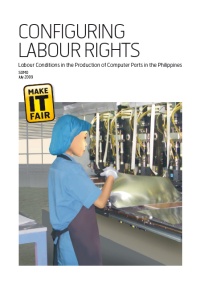Two years ago, reports revealed that suppliers of computer components in the Philippines violated labour laws and codes of conduct of computer brands. Several companies promised improvements, but a new report from makeITfair shows that no real changes have occurred.

“Workers producing computer parts are still working long hours for low wages, and have no possibility to organize themselves in order to demand improved conditions”, says Esther de Haan of the Center for Research on Multinational Corporations (SOMO), coordinator of makeITfair.
Researchers from SOMO and the Philippine Workers’ Assistance Center (WAC) interviewed workers and managers of electronic factories in the Philippines in 2006 and 2008. The new report - Configuring Labour Rights - reveals that labour conditions have hardly improved, despite the fact that some suppliers have upgraded their policy and efforts, and several computer companies have made efforts to audit the labour conditions in the Philippines. According to SOMO, the most important reasons why these measures fail are:
- Computer brands are not addressing the root causes of labour violations at their suppliers, such as the low wages and workers’ right to organize; either in their codes or in their policy;
- Computer brands are non-transparent about their efforts to audit their suppliers, or about what changes they have requested. Most of the brands’ initiatives are superficial, only touching on first-tier suppliers and based on checklist monitoring, and they are auditing their suppliers without working with NGOs and trade unions;
- Computer companies are negotiating down the prices of their suppliers, while at the same time demanding good labour conditions.
The report also concluded that suppliers often did not understand what brand companies expected from them, and brand companies did not reward suppliers for the implementation of improved labour conditions. As one of the managers of a supplier states: “We cannot reject the customers’ demands, otherwise we are out of business”, showing that the constant pressure on prices and delivery times makes it hard for the suppliers in the Philippines to improve labour conditions.
Cecille Tuico of WAC argues explicitly that “the electronic brands have to make sure that their Codes of Conduct can and will be implemented by their suppliers down the supply chain. All the workers deserve fair and decent wages, to be able exercise their rights, and a safe working environment.”
makeITfair calls on computer companies to train their suppliers in implementing codes of conduct, improve their auditing and monitoring systems, enable suppliers to improve conditions by negotiating fair prices and work with local NGOs and trade unions. MakeITfair urges companies and their suppliers to recognize workers’ rights to form or join trade unions and take steps to make this possible.








